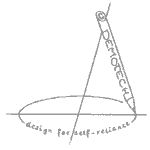|
|
Why
We see the need for redesign of our economy to cure this waste of opportunity.
What bothers us most is that successfully participating in a rich society creates little joy for its participants. Notwithstanding the immense use as well as destruction of recourses. Notwithstanding the cheap labor of poor people that is abundantly made use of.
What amazes us most is joy and merriness that we observe in the streets of poor countries, where people live with a hundred fold lower income.
As a research organization Demotech want to explore the reason for the lack of fun when being rich and the presence of joy when being poor. According all economic know-how it should be the other way round, but this is clearly not the case.
Demotech uses radical design to create economic conditions that differ from the normal. As such Demotech can execute action-research to find out what happens when poor people suddenly find that far more effective technologies are within their grip, without new infrastructure or education that normally is claimed to be a prerogative.
How
The way in which the rope pump was successfully designed and introduced by Demotech may be repeated with other design initiatives. We want to learn what the right conditions for this work are. We want to find out if by this work the capacity for experiencing the joy of poor people can be enhanced. We want to find if the interaction between joy and economy that seemed to be inverted can be corrected. We want to find out if a different economy based on a different technology can cure the lack of joy the present economy brings to the rich.
From all the design initiatives taken in the past, we have a clue that poverty can be redesigned into a sustainable economy that offers more security, comfort and joy than is achieved even in a successful modern economy.
Demotech research will be directed to give a firm base to this expectation and hope.
|

|
|
|
Internal links

|
Mail Bram de Vries inzake armoede
Bram de Vries wrote a mail (NL) with ideas how students Antropology University Utrecht could participate in Demotech research in this topic on Poverty.
|
|
|
|
|
External Links
List with links on Hunger and Poverty
http://www2.fmg.uva.nl/sociosite/topics/inequality.html#POVERTY
The faces of joy
http://mlab.uiah.fi/~juhuuhta/SeriousFun/archives/2005/01/index.html#...How the Poor see themselves:
http://www.id21.org/society/s5ccl1g1.html
Listening to children:
http://www.id21.org/society/s5csw1g1.html
The Poor Philantropist, how and why the poor help each other
http://www.gsb.uct.ac.za/gsbwebb/userfiles/Poor_philanthropist_screen...Actual data on income of the poor and the poorest recorded over a longer period
The Institute for Development Policy and Management (IDPM) at the University of Manchester is currently conducting research into ?Finance for the Poor and Poorest?. The project runs for the three years 1999 to 2001 in Bangladesh, and Orlanda Ruthven in India.
The objective of the research is to shed more light on how poor households manage their finances over a full year, and in particular, how and why they make use of financial services and devices.
http://www.devinit.org/findev/Financial%20Diaries.htm
Embedding technology in community-based production systems through People's Technology Initiatives: Lessons from the Indian experience
The People's Technology Initiative (PTI) represents a radical departure from the conventional paradigm to science and technology (S&T) and rural development by providing an alternative to it. The PTI approach emerged out of the broader People's Science Movement in India, itself a backlash against what was viewed as the weak governance of science and its failure to meet the needs of the poor and enhance their productive capacities. Elements of the PTI philosophy reflect these contextual origins with an approach that seeks to build technology systems around local knowledge, resources, and economies, rather than vice versa, as is the case with conventional models of technology development.
http://www.atypon-link.com/INT/doi/abs/10.1386/ijtm.4.1.3/1?cookieSet...Is there a point below which people are too poor to climb out of poverty?
The researchers identify a threshold - an asset base expected to provide a livelihood more than two times the conventional poverty line - below which households are likely to fall into a poverty trap.
http://www.id21.org/society/s5ama1g1.html
|
|
What other people say... |
If you like you can add your own comment
|
by Sasha - Mon Dec 05 (2005)
no joy in poverty
I cant see any joy in beign poor.All what I can see is despair.I think
poverty is to not have choices.
But,on the other side in the spiritual realm man can be poor and
enlightened.It is a contradiction of life.
Regards,Sasha
|
If you like you can add your own comment |
|
|
What name would YOU give to this device?
You can assist search machines to find this topic by sending Demotech an email form with one or more appropriate names for this device in your language. Such as:
armoede, ....
|




